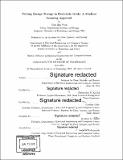Valuing energy storage in electricity grids : a machine learning approach
Author(s)
Wong, Shun Him
DownloadFull printable version (12.57Mb)
Other Contributors
Massachusetts Institute of Technology. Department of Electrical Engineering and Computer Science.
Advisor
Christopher R. Knittel.
Terms of use
Metadata
Show full item recordAbstract
Meeting climate change mitigation targets likely requires the integration of large amounts of renewable energy generation, as well as energy storage systems, into the electric grid. However, the deployment of energy storage systems will remain limited until they become economically attractive, with or without government policy. One of the most profitable and widely studied energy storage system ventures is realtime temporal arbitrage, where the decision to charge or discharge the energy storage device is made according to some charging policy or decision rules, ideally charging when electricity prices are low and discharging when prices are high. In this thesis, state-of-the-art Machine Learning methods in the field of electricity price forecasting were used to accurately predict electricity prices. An improvement on existing recurrent neural network methods was introduced, using contextual knowledge of nodal prices and information such as geolocational spatial correlation data. It was then demonstrated that these prices can be used to inform a charging policy for an energy storage device which will maximize its associated arbitrage revenue. The most profitable policy requires perfect foresight of electricity prices, and hence the true valuation of the energy storage device given imperfect forecasts is bounded from above by a valuation using perfect foresight. The effect of improvements in electricity price forecasting accuracy on the valuation of energy storage systems is then explored using simulations, which places an implicit value on the improvement of electricity price forecasting methods. The impact of these improvements on the introduction of energy storage systems into the grid is then evaluated.
Description
Thesis: S.M. in Technology and Policy, Massachusetts Institute of Technology, School of Engineering, Institute for Data, Systems, and Society, Technology and Policy Program, 2018. Thesis: S.M., Massachusetts Institute of Technology, Department of Electrical Engineering and Computer Science, 2018. Cataloged from student-submitted PDF version of thesis. Includes bibliographical references (pages 83-87).
Date issued
2018Department
Massachusetts Institute of Technology. Department of Electrical Engineering and Computer Science; Massachusetts Institute of Technology. Engineering Systems Division; Massachusetts Institute of Technology. Institute for Data, Systems, and Society; Technology and Policy ProgramPublisher
Massachusetts Institute of Technology
Keywords
Institute for Data, Systems, and Society., Technology and Policy Program., Electrical Engineering and Computer Science.